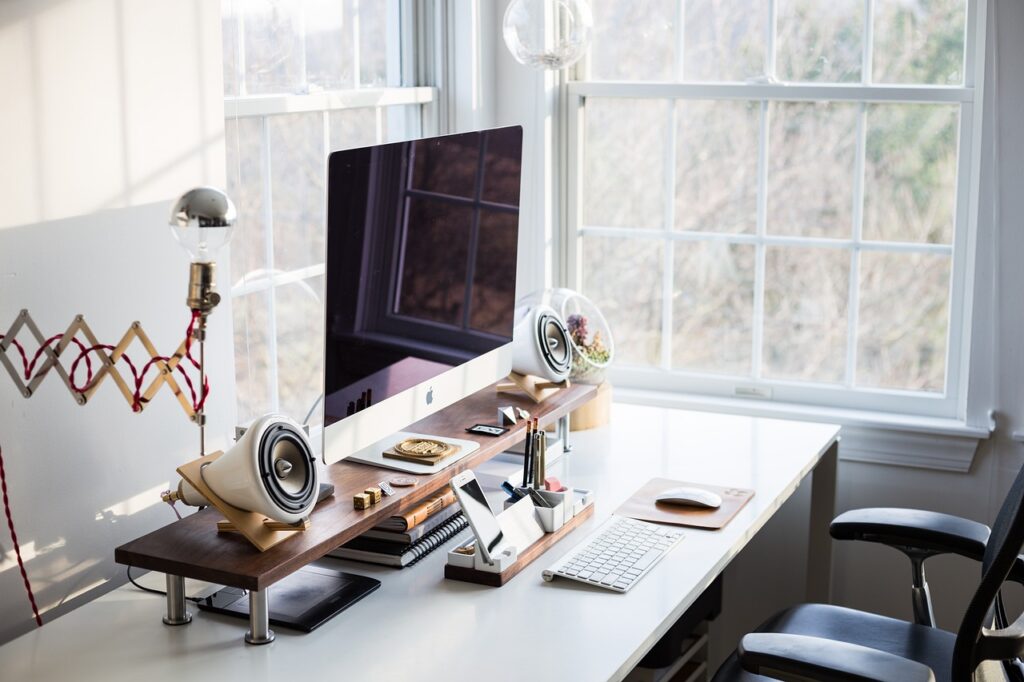Top Feng Shui Tips for Workplaces: Blending Ancient Wisdom with Modern Science
It’s now more possible and desirable in a digitally fluent office to work from home. But can feng shui give any insights or tips on how to optimise your home office?
Feng Shui, an ancient Chinese art, is often viewed as a mystical and complex practice. However, when we strip it down to its essence, it becomes a profound and insightful approach to creating harmonious and productive environments. In modern workplaces, Feng Shui can be wonderfully integrated with principles from Environmental Psychology to enhance well-being and efficiency. Here are the top Feng Shui tips that blend tradition with science for your workplace:
44% of all work-related ill-health cases in the UK are due to stress, depression or anxiety, according to Health and Safety Executive (2019). Another survey of 1015 UK adults in employment suggests that 48% of British workers do little or nothing to relieve work-related stress.
Top feng shui tips for workplaces
1. Clutter-Free Zen: Declutter Your Space
The fundamental principle of Feng Shui is the flow of Qi (energy). A cluttered desk or office impedes this flow, leading to stagnation and reduced productivity. Environmental Psychology supports this, showing that clutter can increase stress and diminish focus. Organize your workspace, ensuring everything has its place. This not only clears the physical space but also your mental space.
2. Strategic Seating: Position Your Desk Wisely
In Feng Shui, the position of your desk is critical. It should ideally face the door (known as the command position) but not be in direct line with it. This position subconsciously empowers you, as you can see who’s entering without being startled. From a psychological standpoint, this reduces stress and increases feelings of control and security.
Sit next to a window: Work by a window because, according to a study published in the Journal of Clinical Sleep Medicine in 214, people who sat next to a window slept on average for 46 minutes longer each night, as opposed to workers who sat in offices without window access. Simple exposure to natural daylight helps the body clock work better.
3. Natural Elements: Incorporate Plants and Water
Incorporating elements of nature into your workplace aligns with Feng Shui’s emphasis on balance and harmony. Plants are not just aesthetically pleasing; they improve air quality and have been shown to enhance mood and productivity. Similarly, a small fountain or water element can introduce soothing sounds, reducing stress and promoting a calming atmosphere.
4. Light the Way: Optimal Lighting Conditions
Light is a vital energy source in Feng Shui. Natural light is preferred, as it boosts mood and energy levels. If natural light is limited, ensure your space is well-lit with warm, soft artificial lighting. Avoid harsh, fluorescent lights as they can cause eye strain and discomfort, hindering productivity.
5. Color Therapy: Choose Your Palette Wisely
Colours play a significant role in Feng Shui, with each colour having specific properties and influences. For instance, blue and green are calming and can enhance concentration, while yellows can stimulate clarity and creativity. Match your color choices to the type of work you do, but ensure they are not overpowering.
6. Personal Touch: Add Personal Items Mindfully
Personal items like photos or mementos can uplift your mood and make your workspace feel more ‘yours.’ However, in Feng Shui, it’s essential to choose these items mindfully. Too many personal items can clutter your space, and some items might subconsciously trigger stress or distraction. Choose items that inspire and motivate you.
7. Ergonomic Harmony: Comfort in Design
Your physical comfort in your workspace is crucial. Ergonomic furniture in line with Feng Shui principles not only enhances comfort but also improves energy flow. An ergonomic chair and desk can reduce physical strain, which in turn can increase your focus and productivity.
8. Soundscapes: Incorporating Soothing Sounds
Feng Shui acknowledges the importance of sound in creating a balanced environment. Gentle, soothing sounds can enhance concentration and reduce stress levels. Consider soft background music, nature sounds, or even a small desk fountain to create a serene auditory environment.
9. Symmetry and Balance: Organize for Harmony
Feng Shui is all about balance and symmetry, reflecting the natural world. Arrange your office furniture and accessories symmetrically to create a sense of balance and harmony. This not only pleases the eye but also creates a more organized and efficient workspace.
10. Mindful Technology: Manage Electronic Distractions
In modern workspaces, technology is unavoidable, but it can be managed Feng Shui-wise. Keep electronic devices like phones and computers in designated areas and minimize wires and clutter. This helps maintain the energy flow and reduces electromagnetic stress, allowing for a more focused and efficient work environment.
Conclusion Embracing Feng Shui in your workplace is about creating a balanced, harmonious environment that nurtures productivity and well-being. By blending these ancient practices with modern environmental psychology, you can transform your workspace into a sanctuary of efficiency and peace. Remember, the key to successful Feng Shui is mindfulness and intentionality in your environment. Happy harmonizing!
Prime and anchor your workplace with positivity
Priming your environment with positivity is a powerful strategy to enhance your mood, productivity, and overall sense of well-being. The idea is to surround yourself with visual and physical cues that evoke positive emotions and thoughts. Here’s how you can do this effectively:
- Positive Imagery and Artwork: Decorate your workspace or living area with images that inspire and uplift you. These could be beautiful landscapes, artwork that resonates with you, or photographs of happy memories. Visual stimuli have a direct impact on our mood, and surrounding yourself with images that evoke peace, joy, or inspiration can significantly influence your mindset.
- Inspirational Quotes: Place motivational quotes in visible places around your environment. Choose quotes that resonate with your goals and values, and that give you a boost of motivation and positivity. You could write them on sticky notes and place them on your mirror, computer monitor, or fridge. Reading these quotes regularly can reinforce a positive mindset and keep you focused on your aspirations.
- Vision Boards: Create a vision board that represents your goals, dreams, and what brings you joy. This could include pictures, drawings, or any other items that symbolize your aspirations and what you love. Regularly seeing this board can remind you of where you’re headed and why, keeping you motivated and positive.
- Personal Mementos: Display personal items that have sentimental value or remind you of happy times. This could be anything from a family photo, a souvenir from a memorable trip, to a gift from a loved one. These items can serve as reminders of happy experiences and the love and support you have in your life.
- Colour Psychology: Utilize the power of colours. Different colours can evoke different emotions and moods. For example, blues and greens are often calming and restorative, yellows can be energizing and uplifting, and reds can stimulate and excite. Choose colours for your space that align with the feelings you want to cultivate.
- Nature Elements: Incorporating elements of nature into your environment can have a calming and rejuvenating effect. This can include indoor plants, a small fountain, or natural materials like wood and stone. Nature has a soothing effect on the mind and can help reduce stress and increase feelings of well-being.
- Aromatherapy: Scents can have a powerful effect on our mood. Consider using essential oils or scented candles that you find uplifting or relaxing. For example, lavender is known for its calming properties, while citrus scents can be energizing and uplifting.
- Music and Sounds: Background music or nature sounds that you find pleasant can also help create a positive atmosphere. Music has the power to change our mood quickly, and listening to tunes that you love can boost your happiness and productivity.
- Lighting: Good lighting is crucial. Natural light is the best option, but if that’s not possible, ensure your environment is well-lit with warm, gentle lighting. Poor lighting can lead to eye strain and mood dips, while a well-lit space can help keep you alert and positive.
- Books: Have lots of books around, everywhere. Studies suggest that the more books you have around, the more intelligent you’ll be. The claim that having lots of books around can make you more intelligent is supported by a study conducted by researchers at the Australian National University and the University of Nevada. Their study, published in the journal “Social Science Research” in 2018, found that growing up in a home with many books enhances skills in adulthood. The study involved participants from 31 countries and assessed their literacy, numeracy, and technological problem-solving skills. The findings suggested that individuals who had around 80 books in their childhood homes had significantly higher literacy levels compared to those with fewer books. This effect plateaued after about 350 books, but the benefits of having a book-rich environment during childhood were evident well into adulthood. The study highlights the importance of access to books and the role of a book-rich environment in long-term skill development.
By carefully curating your environment with these elements, you can create a space that not only looks good but also actively contributes to a positive mindset, helping you to be more productive, creative, and happy in your daily life.



